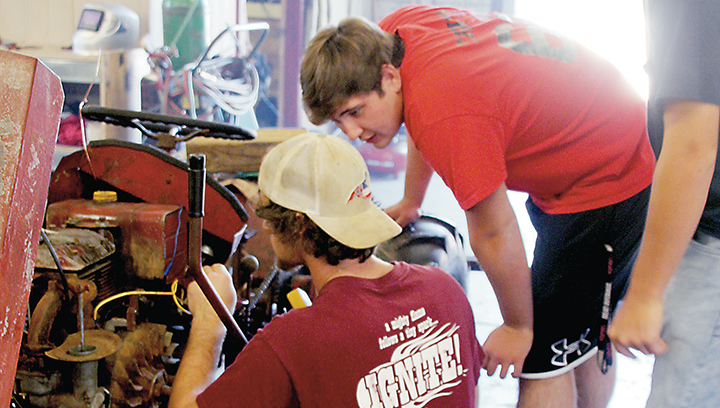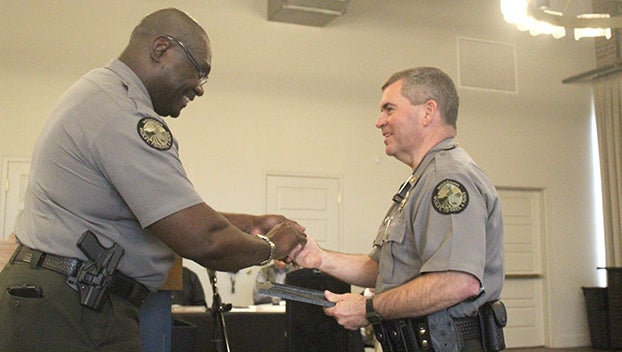Loyd Star students solve real-life problems in agricultural academy
Published 10:27 am Tuesday, November 1, 2016

Photo by Alex Jacks/Loyd Star Agriculture Academy students Stewart Thomas (left) and Canon Travis examine a 1920s tractor in the school’s shop that they’ll restore to its original condition for the owner.
“Learning to do, doing to learn, earning to live, living to serve.”
The FFA motto is one that speaks volumes, and the students and teachers at Loyd Star Attendance Center are taking steps everyday to live it through its agricultural academy.
As the only one of its kind in the state, the Loyd Star Agricultural Academy enables students to focus on areas of study they wish to pursue in college, and prepares them for real-life situations, agricultural science teacher Billy Sumrall said.
“What we have done is take a traditional Ag program a step further,” Sumrall said. “We have incorporated academics as much as possible into our projects. We’re always looking for better ways to teach.”
The agricultural academy style of teaching involves taking a concept from an academic course, like math, science or English, and applying it to a real-life problem in the agricultural classroom.
“Our academy team is made up of 12 faculty members from the math, science, English, special education and agricultural departments,” Sumrall said.
Students enrolled in an agricultural course at Loyd Star follow the Agricultural Environmental Science Technology curriculum, which includes classes in basic agricultural concepts, animal science, agricultural mechanics and agricultural leadership.
“Our curriculum actually starts at the eighth-grade level, so we have students from eighth through 12th grade benefiting from our program,” Sumrall said.
One of the biggest lessons the students learn from the agricultural academy teaching style is problem solving, Sumrall said.
“The students we have started seeing a big difference in are the ones who would come to me and question why they needed math or science,” he said. “All they wanted to do is learn how to work. I want to learn how to weld and that’s it. But, what they didn’t understand is that welding involves a lot of math.”
Sumrall said when students in his agricultural mechanics class could not figure out how to calculate a problem that had to do with a welding project, he sent them to their math teacher.
“I wouldn’t tell them the answer,” he said. “At first, they’d beg for me to tell them how to do it. But, I want them to learn to think, and no one will tell them the answer in the real world. So, I sent them to their math teacher to apply concepts from that class to their project.”
“When those kids show up, our lead math teacher will bring them in, and make my ag mechanic students work the problem out on the board,” Sumrall continued. “If that happens, he now includes his whole class in the teaching moment.”
Sumrall said he and his son, agricultural teacher Seth Sumrall, strive to incorporate those types of learning moments in all of the agricultural classes. Seth Sumrall teaches all of the animal science classes.
“All of the different curriculum teachers have already seen so many students’ grades improve in the last four years with this cross-style of teaching,” Billy Sumrall said.
The agricultural students at Loyd Star range from the high achievers to those just trying to make it through, Sumrall said.
“We touch all types of students, but they all learn something,” he said. “We have students who will go to a four-year school when they graduate, those who will complete at two-year CTE program and then those who will go straight to work.”
Senior agriculture mechanics student Canon Travis said he joined the agricultural academy because he wanted to learn how to weld.
“My future plans are to be a welder,” he said. “When I graduate, I plan to go to Co-Lin to study in their welding program.”
Travis said the ag academy prepared him extremely well to move on to the next phase in his life, but also helped him get through all of his other academic classes.
“The ag academy has prepared be mentally to know what to expect in the real world,” he said.
The Loyd Star Agriculture Academy came into play about four years ago when the school received a $45,000 grant for professional development from the Mississippi Department of Education.
“All we could use the grant for was professional development,” Sumrall said. “It gave our administrators, teachers and myself a way to learn how we would implement this program. It also helped me convince a lot of them that this would be beneficial to our students.”
Sumrall said he knows the agricultural academy has room to grow and develop, but he is thankful the program has been a success so far.
“Our reward as teachers is to see our students succeed,” he said. “When we get to see that light bulb go off, attitudes change and grades improve, there is nothing better.”





